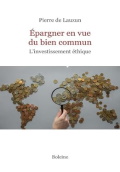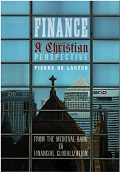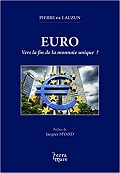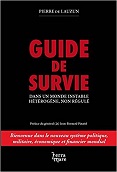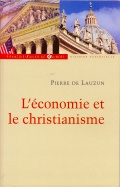


Derniers commentaires
- Un commentaire sur :
Sans titre
- Un commentaire sur :
Sans titre
- Un commentaire sur :
Sans titre
- Un commentaire sur :
Sans titre
- Un commentaire sur :
Sans titre
- Un commentaire sur :
Sans titre
- Un commentaire sur :
Sans titre
- Un commentaire sur :
Sans titre
Responsabilité sociale du propriétaire
dimanche 7 décembre 2014
ETHICS FINANCE, BUSINESS LEADERS AND SOCIETY
Preliminary remarks A company is a human community with a limited role : to produce goods in a way that consumes fewer resources than it produces and which are useful to people who buy them. Its moral duty is to be profitable, but not only : it also implies a clear responsibility towards its members (providers of capital and people inside the firm), to suppliers and clients, and to society at large. This includes the long term future of those communities, including sustainable development in a broad understanding of the word. Profit is a bottom line, not the exclusive criterion for judging any single business decision.
Such accountability is ethical in nature. But to speak of ethics is not sufficient : there are many different conceptions of ethics. I am speaking of ethics as a way of fostering the proper development of people.
In this responsibility, shareholders as owners have the central role as ultimate deciders. This raises serious issues at a time when shareholders are more than often distant players who may buy and sell stocks without relation with the firm nor even a serious knowledge of it.
Managers share part of that responsibility. But managers of very large firms tend to build a kind of class of their own. They have highly benefited from the financial evolution of the last 30 years, much more than shareholders. And their own real accountability may in some respect be even lower that the shareholders’.
In both cases, a major question is the how to recreate that sense of responsibility
Capital and ownership
Owning capital
The role of owners and their hierarchy of priorities is a major issue in any economic system. Even in the case of collective ownership, even in the case of a very egalitarian society, there are people responsible for the definition of what to do with the available resources, especially the collective tools : these are what I would call the real owners. Their values are a major social issue. An egalitarian society with materialistic and egocentrical values will be a low quality society, probably not even a solidary society. The people who would then be in charge of managing assets collectively (pension funds or others) would act in a way which would not be substantially different from cold-hearted capitalists. More broadly, it is certainly good in itself that property should be as diffused in society as possible ; but it is in itself no guaranty of the quality of collective priorities and choices. A major concern in the Catholic Church Teaching is the priority given to labour over capital. It means capital has to be used with a view to provide work in the best way possible : create jobs for sure, but in a way that fosters human development at work and through work. Besides, human activity is considered to be the only real source of creativity, and then of economic value. In my understanding however work includes here the activity of the entrepreneur himself. It means capital cannot be cut from society and has duties towards it. But this does not mean in itself a right of workers to own that capital (although in other respects it is desirable), it means a right that capital be used properly : not only efficiently, but in the right direction. In a decentralised economy, where persons take the responsibility of economic decisions and not a political body, this means you have people who own capital and take their decisions accordingly. And if that economy is a monetary economy, those decisions will take the form of financial decisions. This means finance has to be a major tool in an economy built on autonomous persons. But it also means that finance cannot be isolated from ethics. In short, the fact that form an ethical point of view capital must be used in the right way, that is towards the Common Good, implies ethical rules for the people in charge of deciding the use of that capital ; not that this or that part of society should own that capital. This means that the legal existence of capital and its ownership as distinct from labour or government is per se ethical. What is unethical is the wrong use of capital.
Shareholders
In our societies, economic action is managed through incorporated entities called companies ; the owners of such entities are called shareholders. This means that shareholders have the ultimate responsibility for a company, for the way it behaves towards its stakeholders : labour, financiers, suppliers, clients and society at large. Nobody else can take that responsibility in their place, even management. Shareholders appoint managers (or should !) ; they also elect the Board, choose the purpose of the company ; they may sell it. Of course on a day to day basis management takes a central part of that responsibility, but as stewards of the owners. It is therefore essential that owners of capital accept the ethical responsibility linked with that role. Even small shareholders, who just own a few shares bought on the market. This means there is another responsibility of major importance on the capital markets : I mean another class of stewards, the fund managers. Since they manage the shares, on behalf of the owners, their responsibility is not limited to a merely financial fiduciary duty ; it is part of the global ethical responsibility of these owners. This means finally that responsible investment is a major collective ethical issue. That is, it has to be at the same time active and ethically responsible. Transferring the responsibility to a mythical being called the ‘market’ is meaningless. The market is the collective interaction of decisions taken by persons. If those persons change their priorities and their views, the market will change. Only persons are subject to ethics. This implies a significant qualitative investment of those owners : taking time to examine the issues, define priorities, examine the real situation of the firm, and act, that is participate actively in shareholders meetings and so on. This also means that relations have to be created with the firm and its managers, in most cases on a long term basis. But the possibility of exiting the relationship must also exist : companies are not like families or nations. In some cases, selling may be the only way to send a message. There is no reason to decide that an owner has to be wed for ever to a specific company. Nor a worker either. So freedom to go out of the match must be guaranteed. In the cast of owners of capital, this means possibility to sell their stake. This is one of the functions of the stock exchange. A consequence of this is that day to day trading must keep a limited and subordinated role. Traders cannot take the responsibility of real owners ; their role is to service those owners when they buy or sell : to facilitate the transaction, provide liquidity, and help the price formation. Another consequence is that shares are not financial instruments like others. They are central not only for the economy, but for society at large. Shares are not claims on the company, but a part of it, solidary with it. Owning a share is taking an extremely useful risk - and in the same time accept a responsibility. There is nothing similar with fixed income or derivatives, which are mere claims on somebody, and so in some respect a burden. Detention of shares should be considered a major collective priority. The legal and tax systems should recognise that fact. As you know reality is most often the exact contrary.
Other forms of ownership
Lots of people criticise that organisation. In the best case they may be prepared to accept what has been said of ownership ; but will explain that shareholding as it exists nowadays does not deliver the kind of result you should expect, especially from an ethical point of view. A first answer to this is to say that the status of a corporation does not limit its ethical choices. Nothing implies it should be exclusively short-term, or ethically blind. In the same time the exploration of alternative ways of organising ownership and power in economic activities is quite open. The basic question remains however : what is a company, if not some form of social organisation owned by those who put resources at stake ? Of course this can include labour – with the inconvenient that workers then have a very high stake in the company - much more than in the case of ordinary companies. But even then they will need capital. And capital owners want to control the use of their money. How then organise the cooperation ? My view is that we have to be pragmatic. If some formula, different form the joint stock company and associating both capital and labour, does work, so much the better. If not, one should try and improve the reference on which the present-day company is built. You can also try something else, for example mutual firms. But the experience does not give evidence that mutual organisations are a panacea. Again, mutual ownership does not imply by itself a different set of priorities nor a better form of responsibility.
About finance
This does not mean that the way finance works today is satisfactory. But the flight to utopia is not an option.
Utopia
Some people in the Church have a romantic view of long term relationships based on a total mutual commitment : no global firm, no financial market. But an economy cannot be built exclusively on family-owned SMEs. And more importantly, to block relationships for ever, in an association where the main shareholder (and manager) has a total control of information and power, can be a very unfortunate solution indeed. In an open society you don’t escape the central role of the market.
A much more rewarding path to explore is the way priorities are set. There is no doubt that collective structures, decision-making processes, benchmarking methods and so on can create a collective pressure towards specific solutions, or ways to measure results, that can be not only non-neutral, but ethically debatable. If for example you are supposed to limit yourself to financially measurable results based on short term quotes on the market, what you do is certainly not ethical, nor scientific for that matter. To think that greed is the appropriate way of incentivising people and achieve the best results is an ideological approach to management. Finance should not be self-referential, especially on a short term basis : money is here to provide a way of achieving collectively constructive processes, including the responsibility towards society at large, in its long term perspective.
Sin structures
The concept of sin structures has been introduced by pope saint John-Paul II and is particularly fruitful in finance. The short term pressure linked to quarterly results is typically a sin structure ; it is not the mere fruit of somebody’s greed, it is a collective constraint. The same is true when you consider benchmarking fund managers based on short term measurement of market data. Such a situation is worsened by the fact that in such an environment, the corresponding behaviour can often be described as good, as the fruit of a fiduciary duty. Another kind of sin structure can be found in theoretical elaboration For example the idea that a company is only there to maximise shareholders’ profits ; or that markets are efficient ; or that a 15 % ROE is a reasonable standard etc. Socially responsible investment In the original meaning of the word, socially responsible investment should be the normal form on investment. But it will be ethically satisfactory only if the ethical reference is satisfactory. It is not the case with the usual understanding of responsible investment. In practice it is concentrated on sustainable development (with a huge weighting in favour of environmental issues), of labour and of governance. This is good in itself (provided the criteria are good). But what about duties towards the other stakeholders : suppliers, clients, society etc. ? The fact that the use of a vocabulary using morality or even ethics is often eschewed by ISR people is in itself a negative signal. There is a form of flight to procedures to avoid ethical choices.
It is therefore essential that end investors insist on their priorities, including ethical ones, and refer to the right ones. Instructions given by clients to fund managers (UCITS or insurance company or pension funds) are extremely important in the shaping of society.
An objection to this is to stress the very limited influence most of us have on the market. Trying to stick to dissenting views can even be very counterproductive if your references are too different from mainstream views. There are two types of answers to this. One is that you have to do what your have to do ; and be witnesses to the truth. The other is that markets are very sensitive to whatever happens to them : a minority move can influence the behaviour of firms in a disproportionate way. By joining efforts, you can increase the collective weight of a minority. I think Christians should do that in a more ambitious way.
Financial markets
Short-termism
Short-termism is not a simple question. It can be a natural attitude in a society where you get constantly new information and where people are constantly betting in one way or another. Incidentally this is also the case in politics, certainly by far the most short-term activity in our society.
But in the end the ultimate decider is the investor (or her representative). If she puts her sights on the long term view (in sufficient numbers) the market will be long term oriented. Even in present circumstances, the Stock market has financed for many years companies without profit such as Amazon or biotech because it believed in its long term perspective (rightly or wrongly). Nothing obliges pension funds to be benchmarked on short term figures.
But the fact is that there is a collective pressure towards short-termism. It is partially linked with the general uncertainty of a time where the collective balance of power is rapidly changing across the globe ; but it is also a result of collective behaviour. Market regulation or supervision can help in this respect ; tax systems can favour long term detention of stocks etc. But regulations cannot stop or freeze all transactions. And so the issue of collective priorities and collective assessments remains central. We are back to the ethical issue. Decisions about finance are decisions about the long term contribution of each project or each company, as it appears at any given moment, but in reference to the long term horizon of the project or the company. Pension funds have a responsibility towards this prospective, as their members. In practice this means to accept that one may have to abandon short term possible gains because of higher preferences, both longer term and more substantial.
A case in point is the pressure towards radical changes in companies (especially sale and restructuration) based exclusively on price considerations ; massive redundancies to please the market - as unions say. Per se such a decision may be justified : if an operation is profitable from a market point of view ; it may mean that value is really been created. But it may also mean a short term gain coupled with a destruction of some potential or hidden value that was not expressed in the stock price. This implies that an assessment has to be done by the owners ; it is their responsibility. Again, no market has ever obliged somebody to buy or to sell.
Monetary value and real value
Speculation is in itself ethically acceptable and even necessary, when it means trying to determine what the real value is. But not when it means : trying to outguess where the market will be in the next hours or days ; or worse : trying to manipulate the market. Of course when you try to outguess the next fluctuation, in the end the market will be your judge. But in the meantime you can foster excesses and bubbles. And the final judgement by the market can happen very lately, sometimes years after. In the meantime you create artificial situations and the basis for dramatic crises. The dramatic fact is that for years and years the market can work on the basis of a wrong paradigm, accumulating imbalances. We’ve seen that in the 00’s. In such a situation operators who disagree may have some difficulty in expressing that dissenting view : it may be difficult to run head-on against a sin structure ! Participants to the market should then keep in mind that their duty is to arrive collectively to the best possible price, and join efforts if necessary. And supervisors should see to it that when excesses appear, they have to be reduced as much as is possible.
But ‘speculators’ are not always, not even often, the main cause of crises. In the case of the toxic products before 2007 clever people were selling complicated products to investors that required higher returns - compared to more classical products. And they were professional investors, not naïve retail clients. No speculation here, just a bet on the sustainability of that activity, plenty of greed and a complete lack of ethical responsibility. And, contrary to other simplistic views, it means that you can be concentrated on the needs of your clients as they express them, do something legal, and however be detrimental to the long term health of the market. In the case of the last crisis, the burden of culpability has not been on speculators, but on people supposedly servicing their clients.
Excessive indebtedness as a collective sin
Finally, another major collective issue I would like to mention is the role of debt in our societies. Among other things the crisis has been a crisis of over-indebtedness, of overleverage.
Debt is very different from equity : if you lend money you have a legal claim on the debtor and you may go to courts to get it back. Repayment has nothing to do with the success or the failure of the debtor, except in the case of insolvency. But in the same time your remuneration as a lender is limited too. This means that the lender tends to limit the risk taken. But if he is wrong, the borrower and the lender are both in trouble. And there is not solidarity between creditor and debtor. The borrower has to pay the interest due, except bankruptcy. By contrast in case of difficulties you can skip the dividends and avoid any unwanted burden. Financing risk should then normally be done through capital. This means that in the financing process morality as well as efficiency demand a central role for capital, not for debt.
In addition a large accumulation of debt debts often implies a systemic effect : if your debtor has trouble to repay you, and you have borrowed yourself the money, you too are in trouble. Hence a domino effect, that can bring to a collective disaster. If instead you finance your activity with capital and of course if your investors do too, a failure or insolvency will bring about collective impoverishment. But it does not imply any domino effect. The big stock market crash of 1987 had no significant impact ; the same is true for the end of the “new economy” bubble in 2000.
The common answer in front of debt crises is to foster “confidence”. But confidence may be even more risky. All big crises have been crises of overconfidence in credit, especially in supposedly safe assets like Government debt or lending to real estate : the sovereign debt crisis of the 80s, the S&L crisis of the end 80s, the real estate crisis of the 90s, etc. A triple AAA rating is a major component of a really large crisis. Investors should beware.
I will just mention here the case of Government debt : it was one of the pillars of financial theory in the last decades, because it is supposed to be the reference borrower, the “riskless” one. But except in cases of emergencies like wars, or on a very provisional basis, it is a dangerous and irresponsible behaviour. Public debt is mostly used to finance current expenditures, not investment. It therefore does not finance a way to secure its own repayment. But it can be justified, in a limited way, to finance investments that create new resources making possible the repayment of that debt. That would mean much mower levels of indebtedness.
In short, debt is all too often a dangerous drug, the ideal way not to face difficult choices, and transfer your responsibilities to your successors or heirs. This is exactly what our society is doing.
Besoin de réaliser votre site internet ? - Conception & réalisation du site : WIFIGENIE.NET
 Envoyer à un ami
Envoyer à un ami Imprimer
Imprimer


